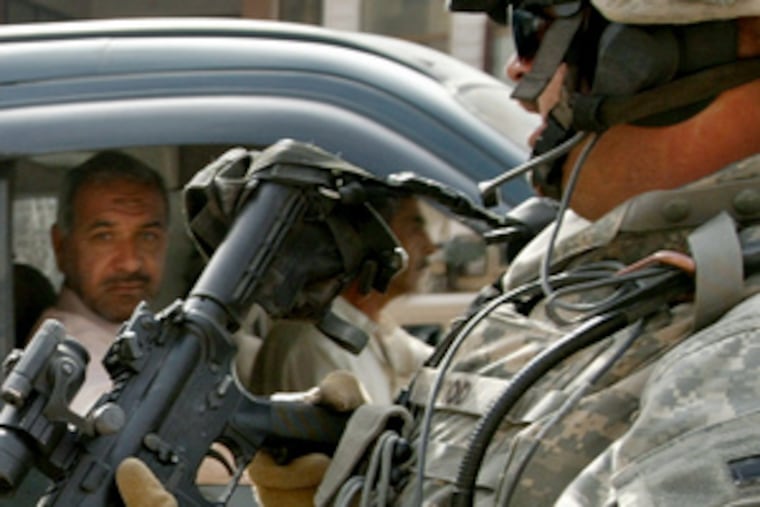House defies Bush on Iraq
War funds pass, 218-208, with a date for withdrawal to begin. Next up: Senate.

WASHINGTON - The House last night brushed aside weeks of angry White House rhetoric and veto threats to narrowly approve a $124 billion war-spending bill that would require troop withdrawal from Iraq to begin by Oct. 1, with a goal of ending U.S. combat operations there by next spring.
The Senate is expected to follow the House's 218-208 vote with final passage today, completing work on the rarest of bills: legislation to try to end a major war as fighting still rages.
Democrats hope to send the measure to the White House on Monday - almost exactly four years after President Bush declared an end to major combat in a speech aboard the USS Abraham Lincoln. That would be a particularly pungent political anniversary for Bush to deliver only the second veto of his presidency.
Last night's vote came after a fiery, partisan debate that has grown familiar after months of wrangling.
"How many more suicide bombs must kill American soldiers before this president offers a timeline for our troops to come home?" asked freshman Rep. Patrick J. Murphy (D., Pa.), an Iraq war veteran who lost nine fellow paratroopers this week in one of the deadliest attacks of the war. "How many more military leaders must declare the war will not be won militarily before this president demands that the Iraqis stand up and fight for their country?
"How many more terrorists will President Bush's foreign policy breed before he focuses a new strategy, a real strategy? This bill says enough is enough."
But House Minority Leader John A. Boehner (R., Ohio) pleaded: "Every generation of Americans have had their obligation to stand up and protect their country, not just for today but for tomorrow and the next generation. We have a solemn obligation to the American people to finish the job we started."
Rep. Jerry Lewis (R., Calif.) said: "Al-Qaeda will view this as the day the House of Representatives threw in the towel."
Republicans stayed largely united, but even House Minority Whip Roy Blunt (R., Mo.) acknowledged a growing political strain as the bad news from Baghdad continues unabated.
"We need to get some better results from Iraq," he said, "both politically, economically and militarily in foreseeable future."
Indeed, the vote came before a backdrop of troubling news. The administration dispatched Gen. David Petraeus, the commanding general in Iraq, to plead for patience as he briefed House and Senate lawmakers on efforts to quell sectarian and Islamic fundamentalist violence with the influx of more than 28,000 additional troops.
After the briefings, Petraeus met with reporters and described progress in Iraq as mixed. Sectarian killings in Baghdad are down by a third since January, he said, and progress in the Sunni province of Anbar has been "almost something that's breathtaking," he said.
On the other hand, he said, "the ability of al-Qaeda to conduct horrific, sensational attacks obviously have represented a setback."
He appeared to warn war opponents against intemperate comments, saying, "It is always helpful to remember the various audiences out there as this wonderful democratic process goes forward, and those are our partners, our allies, the enemy, and also frankly our men and women in uniform."
For Democrats, he elliptically echoed recent comments by Defense Secretary Robert M. Gates when he suggested that pressure from Washington may be helpful if broadly applied to the fragmented Iraqi government.
Petraeus' mixed assessment stood in contrast to a bleak quarterly report from the U.N. Assistance Mission for Iraq, which declared that Iraq remained in the grip of a "breakdown in law and order" and faced a "rapidly worsening humanitarian crisis."
Beneath yesterday's debate, halting talks have already begun on a second funding bill for the war, on the assumption that Bush will veto the first. That secondary legislation sets strict requirements for resting, training and equipping troops but would authorize Bush to waive those restrictions as long as he publicly justifies the waivers.
The bill also establishes benchmarks for the Iraqi government to meet: Create a program to disarm militias, reduce sectarian violence, ease rules that purged the government of all former Baath Party members, and approve a law on sharing oil revenue.
Unless the Bush administration determines by July 1 that those benchmarks are being met, troops would begin coming home immediately, with a goal of completing those withdrawals by the end of the year. If benchmarks are being met, troops would begin coming home no later than Oct. 1, with a goal of completing the troop pullout by April 1.
After combat forces are withdrawn, some troops could remain to protect U.S. facilities and diplomats, pursue terrorist organizations, and train and equip Iraqi security forces.
Blunt said neither the president nor the vast majority of GOP lawmakers would ever accept restrictions on troop deployments or binding withdrawal dates. But, he said, Republicans would back the benchmarks. Rather than tying those measurements of progress to military consequences, he suggested linking them to the $5.7 billion in the bill for non-military assistance to the Iraqi government.
Democrats, from the party's conservative wing to its liberal left, said last night that they would not buckle to Bush's demand for war money with no policy strings attached.
"He's not getting what he wants," said Rep. Dennis A. Cardoza, a conservative Democrat from California.
How They Voted
EndText